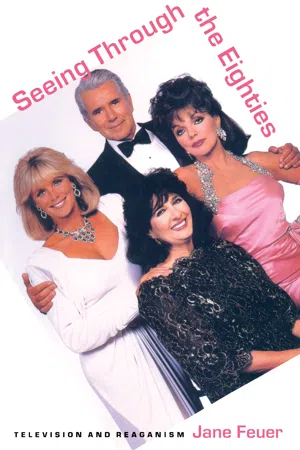
- English
- PDF
- Available on iOS & Android
About This Book
The 1980s saw the rise of Ronald Reagan and the New Right in American politics, the popularity of programs such as thirtysomething and Dynasty on network television, and the increasingly widespread use of VCRs, cable TV, and remote control in American living rooms. In Seeing Through the Eighties, Jane Feuer critically examines this most aesthetically complex and politically significant period in the history of American television in the context of the prevailing conservative ideological climate. With wit, humor, and an undisguised appreciation of TV, she demonstrates the richness of this often-slighted medium as a source of significance for cultural criticism and delivers a compelling decade-defining analysis of our most recent past.
With a cast of characters including Michael, Hope, Elliot, Nancy, Melissa, and Gary; Alexis, Krystle, Blake, and all the other Carringtons; not to mention Maddie and David; even Crockett and Tubbs, Feuer smoothly blends close readings of well-known programs and analysis of television's commercial apparatus with a thorough-going theoretical perspective engaged with the work of Baudrillard, Fiske, and others. Her comparative look at Yuppie TV, Prime Time Soaps, and made-for-TV-movie Trauma Dramas reveals the contradictions and tensions at work in much prime-time programming and in the frustrations of the American popular consciousness. Seeing Through the Eighties also addresses the increased commodification of both the producers and consumers of television as a result of technological innovations and the introduction of new marketing techniques. Claiming a close relationship between television and the cultures that create and view it, Jane Feuer sees the eighties through televison while seeing through television in every sense of the word.
Frequently asked questions
Information
Table of contents
- Contents
- Acknowledgments
- Introduction: The Relationship between Politics and Television in the Reagan Era
- 1 The Made-for-TV “Trauma Drama”: Neoconservative Nightmare or Radical Critique?
- 2 The Yuppie Spectator
- 3 Yuppie Envy and Yuppie Guilt: L.A. Law and thirtysomething
- 4 Art Discourse in 1980s Television: Modernism as Postmodernism
- 5 Serial Form, Melodrama, and Reaganite Ideology in Eighties TV
- 6 The Reception of Dynasty
- Afterword: Overturning the Reagan Era
- Appendix A: Trauma Dramas
- Appendix B: Yuppie Programs
- References
- Index